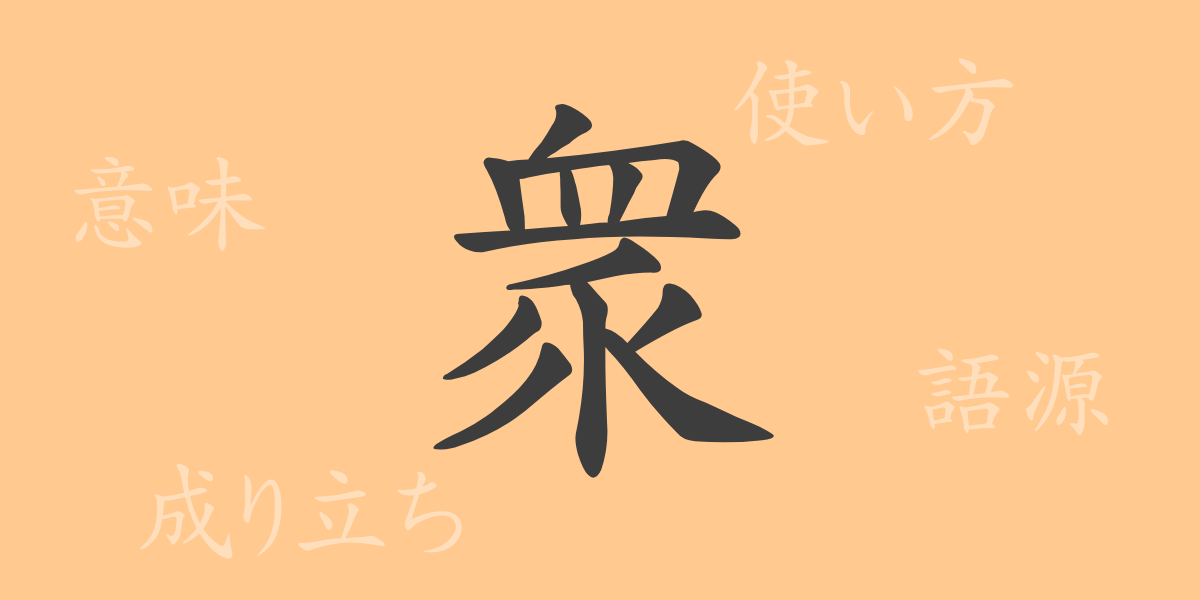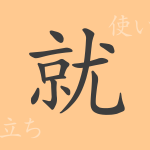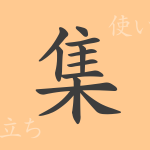The beauty of the Japanese language lies in its complexity. Each character carries a history, and its meanings are deeply rooted in culture. This time, we focus on the commonly used kanji “衆(しゅう, shuu)”, exploring its origins and contemporary usage. Through the stories woven by this character, we hope you will appreciate the depth of the Japanese language.
Origin of 衆(しゅう, shuu) (Etymology)
The kanji “衆(しゅう, shuu)” originates from ancient China and represents the idea of multiple people gathering. Originally written as “眾(しゅう, shuu)”, it symbolized many eyes coming together, hence signifying a multitude. Over time, it was simplified to “衆(しゅう, shuu)” and adopted in Japan. This character is used to denote groups or crowds and often appears in social contexts.
Meaning and Usage of 衆(しゅう, shuu)
The kanji “衆(しゅう, shuu)” means “a multitude of people” or “crowd” and is used in various contexts. Specifically, in politics, it is seen in terms like “衆議院(しゅうぎいん, shuugiin)” (House of Representatives). In daily conversation, it appears in terms like “人衆(じんしゅう, jinshuu)” or “衆人(しゅうじん, shuujin)”. It can also be used metaphorically, as in “意見が衆多する(いけんがしゅうたする, ikenga shuutasuru)” (many opinions exist).
Readings, Stroke Count, and Radical of 衆(しゅう, shuu)
Let’s delve into the readings, stroke count, and radical of the kanji “衆(しゅう, shuu)”.
- Reading: The on’yomi (音読み) reading is “シュウ(しゅう, shuu)”, and the kun’yomi (訓読み) reading is “おお.い(おおい, ooi)”.
- Stroke count: The kanji “衆(しゅう, shuu)” has 12 strokes.
- Radical: The radical is 行部(ぎょうぶ, gyoubu).
Idioms, Phrases, and Proverbs Using 衆(しゅう, shuu)
There are numerous idioms, phrases, and proverbs in Japanese that incorporate the kanji “衆(しゅう, shuu)”. Here are some examples:
- 衆議院(しゅうぎいん, shuugiin): The House of Representatives, one of the two houses of the Japanese Diet.
- 衆人環視(しゅうじんかんし, shuujiin kanshi): Being under the watchful eyes of many people; in the public eye.
- 衆知を集める(しゅうちをあつめる, shuuchi o atsumeru): To gather the wisdom and opinions of many people.
- 衆望(しゅうぼう, shuubou): The hopes and wishes of many people.
- 衆目が一致する(しゅうもくがいっちする, shuumoku ga icchi suru): Consensus or agreement among many people.
Conclusion on 衆(しゅう, shuu)
The kanji “衆(しゅう, shuu)” symbolically represents the concept of a multitude of people or opinions gathering. It is widely used in Japanese, from politics to everyday conversation and idiomatic expressions. With 12 strokes, it is classified under the 行部(ぎょうぶ, gyoubu) radical. The readings are “シュウ(しゅう, shuu)” for on’yomi and “おお.い(おおい, ooi)” for kun’yomi. Understanding the rich meanings and usages of this single character enhances one’s comprehension of the Japanese language.

























